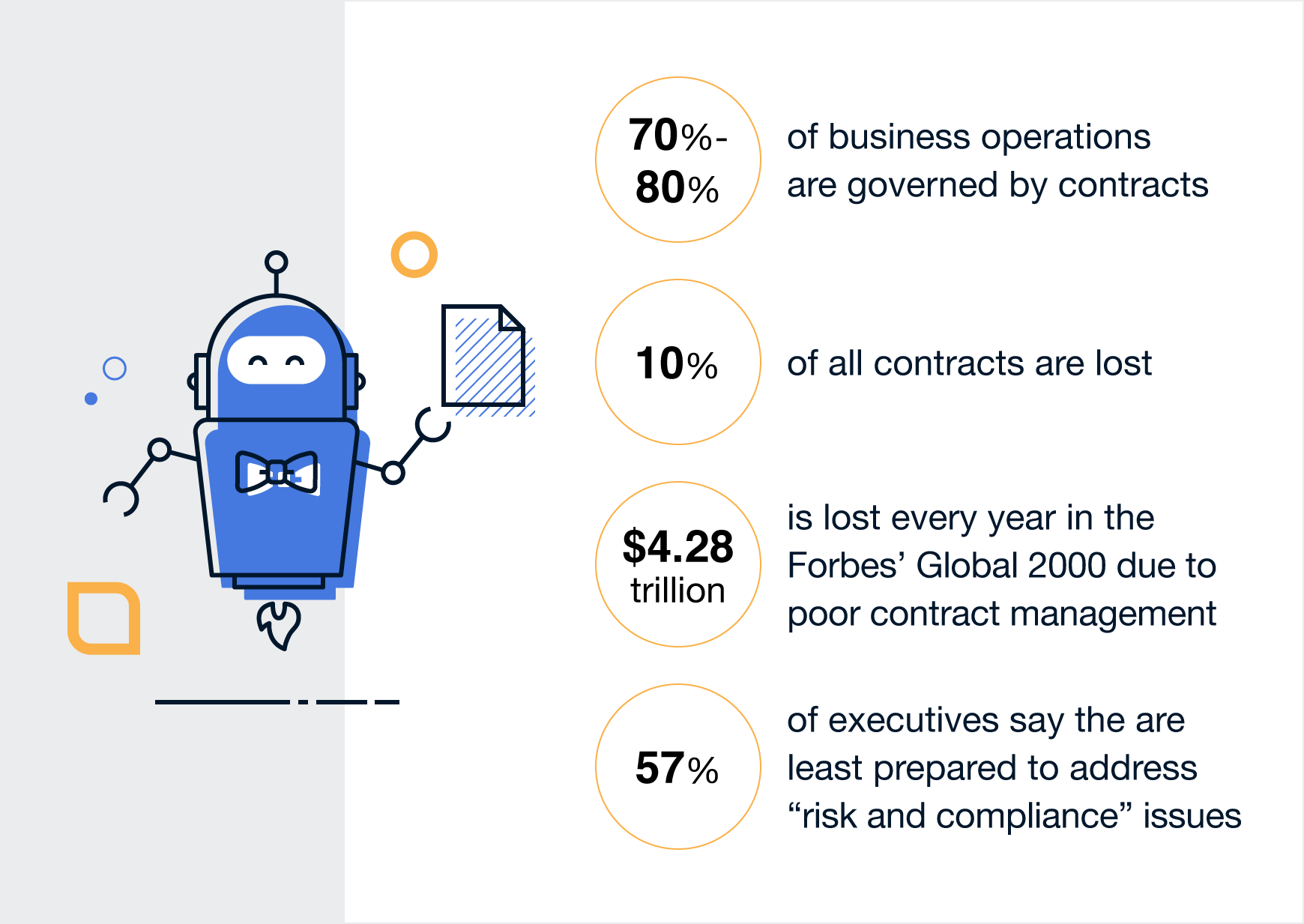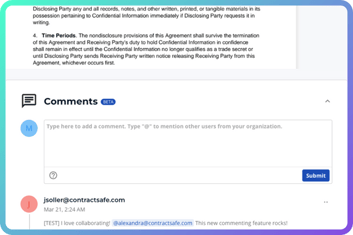Did you know that the first-ever contract was created over 4,000 years ago?
It was a clay tablet from Mesopotamia that detailed the transfer of goods from one party to another. And while modern contracts may not need to be written in stone, they remain an essential part of how we do business today.
But what makes a contract legally binding, and why?
Well, if you’ve already made it through law school, you can probably skip this one, but for everyone else, knowing exactly what makes a contract legal and binding can be a lifesaver.
If you want to understand these elements and why they’re important, look no further. This post will take a look at the seven essential elements of a contract and why they matter.
TL;DR
- Contracts are an essential part of doing business.
- The seven elements of a contract are classification, offer, acceptance, awareness, consideration, capacity, and legality.
- Contract management software can help ensure contracts are legally compliant.
What Is a Contract, and Why Are They Important?
Before diving straight into the deep end, let's learn a little about what a contract is and why it's important:
- Contracts are agreements between two or more people that formalize a new or renewing relationship or transaction.
- They’re used in all kinds of business dealings, from buying property, trading services or goods, employment arrangements, and more.
- Contracts are essential for making sure all parties know their rights and responsibilities before they enter into any kind of agreement. In other words, having a contract helps protect everyone involved in the transaction.
Contracts are like snowflakes. Yes, they’re all unique, but they’re ultimately made of the same base elements.
There are many types of contracts, but, if you’re following best practices for contracts, you should include these elements: offer, acceptance, awareness, consideration, capacity, and legality.
Below, we’ll cover the six elements that make up a contract in more detail.
1. Offer
You can't have a contract without an offer. An offer is what kicks off the whole spiel. To create a contract, one party needs to make
You can't have a contract without an offer. An offer is what kicks off the whole spiel. To create a contract, one party needs to make an offer and the other needs to accept.
The offer can be broken down into two parts: expression and intention.
The expression can be verbal, written, or implied through conduct.
The intention needs to show agreement to the terms of the offer.
The offer needs to be specific, with enough details about the exchange of value so everyone knows how the offer benefits each party. The value can be money or something else like an action, service, or outcome.
It also has to have a clear acceptance period and must be communicated to the other party — or else it won't count.
After an offer has been made, the receiving party can reject the offer, accept the offer, or reply with a counteroffer.
2. Acceptance

Once an offer has been made, the other party will have to accept it in order for the contract to be valid. After all, what’s the point of making an offer if nobody accepts it?
Most consider a contract to be accepted once it’s signed. Anything else or the negotiation of terms may be considered a counteroffer and would restart the process.
Inaction does not mean the offer has been accepted — both parties must take explicit action to create an enforceable contract. Think of it like a dance, where one person leads, and the other follows until both are in sync.
There are two primary types of acceptance to be aware of: express and implied.
Express acceptance is when the offer is accepted in the same way it was given. For example, if you send an email with all the details of your offer and the other party replies by email with “I accept,” then that would be express acceptance
Implied acceptance is when action is taken that indicates an acceptance of the offer. If, for example, you have a verbal agreement with a lawn mowing company to show up every month and mow the lawn even though there is no contract, this would be considered implied acceptance. The key here is that you need to act on what was offered.
Likewise, if one party starts to perform their duties under a contract before explicitly accepting it in writing, that can also be considered acceptance. This could be painting a house while waiting for the contract to be signed, or starting work on a design project before it is officially accepted.
3. Awareness

For a contract to be valid, all parties need to be aware of the offer and the acceptance. Sometimes called a “meeting of the minds,” awareness means that all parties understand what they’re getting into.
If one party is unaware of the terms and conditions, then they can argue that there was no true agreement.
This may sound obvious, but clarity is everything. That’s why contracts will usually contain a section that explains all the details in plain language so that everyone knows exactly what they’re signing up for.
If there is no “meeting of the minds,” the contract may not be valid. After all, you can't dance if you don't know the steps.
4. Consideration

The consideration is the whole reason we’re here. Consideration is the value that each party agrees to exchange to make a contract valid.
The consideration can be money, goods, services, or any other form of legal tender that both parties agree upon. This element is essential because it sets out what each party gets if they fulfill their end of the bargain.
An example of this could be an employer-employee relationship. No one is lining up to work for free, right? And no employer is going to pay someone for nothing.The exchange of value here is the paycheck an employee receives for doing the job outlined in their job description.
5. Capacity

Simply put, capacity is each party’s ability to comply with their end of the contract. Both parties must be capable of understanding the obligations they’re entering into and have a legal right to do so.
For instance, minors can’t enter into contracts because they don’t have the capacity to understand the implications of their decision. Similarly, those who are incapacitated due to mental illness or intoxication won’t be held legally responsible for any agreements made during that state.
Here are a few examples where a person may lack capacity:
- They are under the age of 18
- They are mentally unsound
- They are under the influence of drugs or alcohol
- They are under duress
- They do not speak the language
6. Legality

Finally, you need to make sure that the contract you’re entering into is legal. In other words, it shouldn’t violate any laws or regulations.
Several things can make a contract illegal, including agreements that:
- Violate public policy: Agreements must be legal within federal, state, and local law ordinances.
- Are made under misleading circumstances: This includes agreements made under duress or based on fraud or misrepresentation.
- Involve illegal activities: Agreements cannot require either party to do something that is against the law.
- Involve a person who lacks the capacity to sign a contract: Agreements cannot involve a minor or person who is mentally unsound.
Any contract that is deemed illegal is void and unenforceable.
Additionally, if a contract is impossible to fulfill due to circumstances beyond the control of the parties involved, it may be considered a force majeure event.
Force majeure events are typically the result of something really bad happening. For example, when the world went into lockdown in 2020, many contracts were impossible to fulfill as a result of shuttered factories, travel restrictions, or supply chain disruptions. Other force majeure events might include natural disasters, war, civil unrest, or acts of terrorism.
How Is a Contract Enforced?
A large business has an average of 20,000 to 40,000 contracts to keep up with at any given time, so disagreements are bound to arise. But what actually happens when there is a dispute?
When a contract is breached, the aggrieved party has several legal remedies available.
The most common remedy is (surprise!) cold hard cash. Depending on the specific breach of contract and any other applicable laws, an aggrieved party can seek compensatory and/or punitive damages and attorney’s fees.
But this can be a lengthy process. In fact, in the United States, it takes an average of 444 days to enforce a contract.
And if you consider the fact that litigation costs alone for an average contract dispute are $91,000, you can see why so many people choose to settle outside of court.
The good thing, though, is that a comprehensive contract and proper contract management can prevent disputes from happening altogether. By clearly outlining roles and responsibilities and including a dispute resolution clause, all parties involved know exactly where they stand.
Take the Legwork Out of Contract Management
Compliance with a contract's terms is especially important when you consider that 70% to 80% of any given business's operations are governed by contracts.
That’s why 57% of senior executives say “risk and compliance” is one of the categories they’re least prepared to effectively address.
And just like your wallet and keys every other morning, about 10% of those contracts are lost, according to a report by the Journal of Contract Management.
The true cost of poor contract management is staggering, sitting at an estimated 9% of total company revenue.
Across the Forbes Global 2000 list, as much as $4,284,000,000,000 in revenue is lost yearly due to poor contract management. That's 4 trillion (trillion, with a T).
But that doesn't have to be you.
Contract management software can help streamline the contract management process, and help ensure contract compliance.
By automating the process, you can be sure that your contracts are stored securely and in accordance with regulations and laws. Plus, you can easily access all your contracts, track their progress throughout the contract management lifecycle, and receive notifications for important dates and obligations.

Not sold yet?
Here are some of the ways contract management software can help your business today:
Execution
Contract management software can help you make sure everything has been approved, all parties have signed, and all conditions are outlined.
Date Reminders
Reminders can inform you when important dates are coming up, so you can stay on top of your obligation deadlines and renewal dates.
Audits
A digital repository helps guarantee compliance and mitigate risks by providing an auditable record that shows exactly who has done what when it comes to all your contracts — so no lapses go unnoticed.
Version Tracking
Contract management software also keeps track of different versions. That'll help you make sure everyone is reading the right document.
Security
Data security is a big concern when it comes to contract management. With the right software, you can rest assured knowing your information is safe and secure.
FAQs
What are void contracts?
A void contract is an agreement that has become unenforceable due to a defect in the formation process. This could be a lack of mutual consent, fraud, misrepresentation, or illegal terms.
When does a contract become legally binding?
A contract becomes legally binding when the parties to the agreement agree to it, and all requirements for a valid contract are met. This includes the offer and acceptance of terms, consideration, and a meeting of minds.
What’s the difference between an agreement and a contract?
An agreement is an understanding between two or more parties that they can rely on. A contract is a legal document outlining the terms of an agreement and carries more weight in a court of law.
Ensure Your Contracts Are Compliant Today
Contracts are an essential part of any business, but they can be daunting to manage. Contract management software helps you stay on top of all your documents and ensures contract compliance throughout the entire contract management lifecycle.
When you’ve got thousands of contracts to manage, ContractSafe can take the hard work off your plate. Get things done efficiently and easily, from searching and finding contracts in just a few clicks to ensuring compliance with regular contract audits. You can sleep at night knowing nothing is slipping through the cracks.
Schedule a demo to see how contract management software can transform your business today.


















